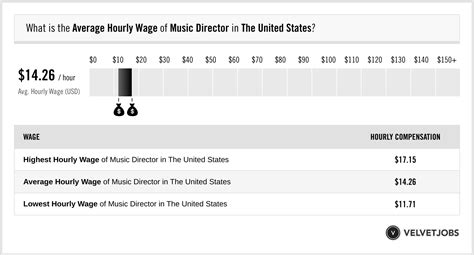Music directors play a vital role in the success of any musical production, overseeing every aspect of the musical performance, from selecting the repertoire to conducting the orchestra. As such, they are highly skilled and experienced professionals who command a significant salary.

Average Music Director Salary
According to the Bureau of Labor Statistics (BLS), the median annual salary for music directors in the United States was \$51,560 in May 2021. The lowest 10% of earners made less than \$26,990, while the highest 10% earned more than \$107,110.
Factors Affecting Salary
Several factors can influence a music director’s salary, including:
- Experience: Music directors with more experience typically earn higher salaries.
- Education: Directors with advanced degrees in music, such as a master’s or doctorate, tend to command higher pay.
- Institution: Directors who work for prestigious institutions, such as major orchestras or opera companies, generally earn more than those working for smaller organizations.
- Location: Salaries for music directors can vary depending on the region of the country.
- Unionization: Directors who are members of unions may benefit from higher negotiated salaries.
Salary Ranges for Different Positions
The salary range for music directors can vary considerably based on their specific role and responsibilities. For example:
- Artistic Director: Artistic directors, who oversee the artistic vision and direction of a musical organization, typically earn higher salaries than other types of music directors.
- Conductor: Conductors, who lead the orchestra and guide the musical performance, typically earn a higher salary than other types of music directors.
- Music Director: Music directors, who oversee the entire music department of an institution, typically earn higher salaries than other types of music directors.
Benefits of Being a Music Director
In addition to their salaries, music directors often enjoy a range of benefits, including:
- Health insurance
- Sick leave
- Paid vacation
- Retirement plans
- Opportunities for professional development
- Recognition and prestige
Tips for Increasing Salary Potential
If you are an aspiring music director looking to increase your salary potential, consider the following tips:
- Gain experience: The more experience you gain, the more valuable you become to potential employers.
- Get educated: Pursue a higher degree in music to enhance your skills and knowledge.
- Network: Attend industry events and connect with other music professionals.
- Join a union: Unions can negotiate higher salaries for their members.
- Be open to relocation: Consider moving to a region where salaries for music directors are higher.
Table 1: Average Music Director Salaries by Experience
| Experience Level | Median Annual Salary |
|---|---|
| Less than 1 year | \$32,500 |
| 1-4 years | \$45,000 |
| 5-9 years | \$60,000 |
| 10-19 years | \$75,000 |
| 20 years or more | \$90,000 |
Table 2: Average Music Director Salaries by Education
| Education Level | Median Annual Salary |
|---|---|
| Bachelor’s degree | \$45,000 |
| Master’s degree | \$60,000 |
| Doctorate degree | \$75,000 |
Table 3: Average Music Director Salaries by Institution Type
| Institution Type | Median Annual Salary |
|---|---|
| Major orchestra | \$100,000 |
| Opera company | \$90,000 |
| University music department | \$80,000 |
| Community orchestra | \$60,000 |
| School music department | \$50,000 |
Table 4: Benefits of Being a Music Director
| Benefit |
|—|—|
| Health insurance |
| Sick leave |
| Paid vacation |
| Retirement plans |
| Opportunities for professional development |
| Recognition and prestige |
